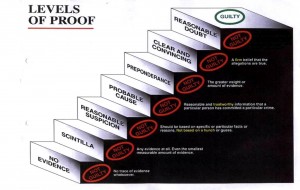




Colorado Criminal Law – Do I Have The Right To Use Self Defense Against The Police During An Arrest To Defend Against Charges Of Obstruction Of A Peace Officer and Resisting Arrest?
By H. Michael Steinberg Colorado Drug Crimes Criminal Defense Lawyer

Colorado Criminal Law – Do I Have The Right To Use Self Defense Against The Police During An Arrest To Defend Against Charges Of Obstruction Of A Peace Officer and Resisting Arrest
Colorado Criminal Law – Do I Have The Right To Use Self Defense Against The Police During An Arrest To Defend Against Charges Of Obstruction Of A Peace Officer and Resisting Arrest? A common scenario when Colorado police effectuate an arrest is the reaction of the person being arrested caused by the confusion of the moment. When a person naturally defends themselves against the often brutal tactics used by the police – they can be charged with numerous different crimes – among them:
- Obstruction of a Peace Officer 18-8-104
- Second Degree Assault On A Peace Officer 18-3-202, and
- Resisting Arrest 18-8-103
The most common of these is Obstruction of a Peace Officer. Here are the elements of that crime:
1. the defendant,
2. in the State of Colorado, at or about the date and place charged,
3. knowingly,
4. obstructed, impaired, or hindered the enforcement of the penal law,
5. by a peace officer,
6. acting under color of his official authority,
7. without the affirmative defense of self defense (§ 18-8-104(1)(a), C.R.S.)
To understand the circumstances surrounding an arrest – one begins with a description of the kinds of contact that can happen with the police. These are by listed by the degree of the right of the police to interfere in your life – from the least authority to interfere with your freedom to the most authority to interfere with your freedom:
1. The Consensual Encounter
2. The Investigative Detention (based on the reasonable suspicion a crime has occurred),
3. and Probable Cause Arrests.
 1. The Consensual Encounter With The Police
1. The Consensual Encounter With The Police
The Fourth Amendment to the United States Constitution is your right to be free from “unreasonable government searches and seizures.” Likewise, the Colorado Constitution contains the same protections.
When you are confronted by the police, the law provides a certain level of protection depending on the nature of the evidence of criminal conduct at hand. So it is the type of encounter you experience that impacts your constitutional rights.
In a consensual encounter the police may approach you and engage you in conversation. Here the limitations on police authority are the most severe. You are free in a consensual encounter to answer the officer’s questions or to not answer any questions of the police and you may walk away. If you do not want to answer questions – I suggest asking the question “Am I free to leave?” before attempting to walk away. Wait for the answer. If it is no – ask for a lawyer if you are uncertain what the questioning is about. “Lawyering up ” so to speak – ends the inquiry in most cases.
In a consensual encounter the police do not have “reasonable suspicion” (an investigative detention) to detain you or “probable cause” (probable cause arrests) to arrest you. Colorado criminal law views the situation from the perspective of whether a “reasonable person” in your shoes approached by the police would feel “free to leave.” The analysis turns on the surrounding circumstances of the encounter.
Your Fourth Amendment rights and right to self defense may be triggered if the police have no evidence that you committed a crime and there is an unreasonable show of physical force. At the point that you want to leave and your freedom is restrained the encounter is not longer consensual.
Colorado Law On The Right Of Self Defense During A Perceived Consensual Encounter
The law provides that you have the legal right to terminate a consensual encounter AND to use self defense IF the police are using excessive force on you during that encounter. This right applies to ANY encounter with the police as the right of self defense against a police officer extends to ALL THREE types of police encounter as further described below.
Self-defense is an affirmative defense to all three crimes listed above – the crime of obstructing a peace officer, the crime of resisting arrest and the crime of second degree assault on a peace officer.
The right of self defense may be raised in a trial by the Defendant when there is any evidence that the Defendant:
“reasonably believed that the officer used unreasonable or excessive force, and that, in response, the defendant used a degree of force that he reasonably believed to be necessary to defend himself against the officer’s actions.”
Using the Obstruction charge as the best example:
It is an affirmative defense to the crime of Obstructing a Peace Officer that:
The defendant used physical force upon another person:
1. in order to defend himself or a third person from what he reasonably believed to be the use r imminent use of unreasonable or excessive force by the victim, and
2. he used a degree of force which he reasonably believed to be necessary for that purpose.
The defense turns then, on whether the jury believes that a Defendant reasonably believed that the officers’ use of force against him was unreasonable or excessive. This turns on the reasonableness of the Defendant’s belief at the time of the encounter – the Defendant’s understanding of the nature of the initial encounter with the police.
The Defense of Self-Defense MAY BE Available Against a Charge for Obstructing a Peace Officer § 18-8-104.
The Colorado Obstruction Of A Peace Officer Law Contains A Troublesome Section
Here is a breakdown of the actual Colorado Obstruction Of A Peace Officer Law
The statute – . § 18-8-104(1)(a), C.R.S. – provides:
A person commits Obstructing a Peace Officer:
. . when, by using or threatening to use violence, force, physical interference, or an obstacle, such person knowingly obstructs, impairs, or hinders the enforcement of the penal law or the preservation of the peace by a peace officer, acting under color of his or her official authority . . .
[HMS – BUT the law also contains this provision:](2) It is not a defense to a prosecution under this section that the peace officer was acting in an illegal manner, if he or she was acting under color of his or her official authority.
A peace officer acts “under color of his or her official authority” if, in the regular course of assigned duties, he or she makes a judgment in good faith based on surrounding facts and circumstances that he or she must act to enforce the law or preserve the peace.
Colorado courts have held that this provision – section (2) does not take away the right of self-defense. Colorado’s law of self defense DOES apply to an the mishandling of an arrest or attempted arrest of a Colorado citizen by law enforcement.
Here is the Colorado law of self defense:
“a person is justified in using physical force upon another person in order to defend himself or a third person from what he reasonably believes to be the use or imminent use of unlawful physical force by that other person.” § 18-1-704(1), C.R.S.
“Self Defense permits a person being accosted by the police to defend himself when he or she reasonably believes that unreasonable or excessive force… is being used by law enforcement officers or that its use is imminent.”
Now Compare Resisting Arrest 18-8-103
The Colorado Resisting Arrest law – 18-8-103 – specifically provides a right to use self defense:
It is no defense to a prosecution under this section that the peace officer was attempting to make an arrest which in fact was unlawful, if he was acting under color of his authority, and in attempting to make the arrest he was not resorting to unreasonable or excessive force giving rise to the right of self-defense. § 18-8-103(2), C.R.S. .
Here is the entire law:
Resisting Arrest (18-8-103)
1.A person commits resisting arrest if he knowingly prevents or attempts to prevent a peace officer, acting under color of his official authority, from effecting an arrest of the actor or another, by:
(a) Using or threatening to use physical force or violence against the peace officer or another; or
(b) Using any other means which creates a substantial risk of causing bodily injury to the peace officer or another.
2. It is no defense to a prosecution under this section that the peace officer was attempting to make an arrest which in fact was unlawful, if he was acting under color of his official authority, and in attempting to make the arrest he was not resorting to unreasonable or excessive force giving rise to the right of self-defense. A peace officer acts “under color of his official authority” when, in the regular course of assigned duties, he is called upon to make, and does make, a judgment in good faith based upon surrounding facts and circumstances that an arrest should be made by him.
3.The term “peace officer” as used in this section and section 18-8-104 means a peace officer in uniform or, if out of uniform, one who has identified himself by exhibiting his credentials as such peace officer to the person whose arrest is attempted.
4.Resisting arrest is a class 2 misdemeanor.
The “Illegal Manner” Language In The Colorado Obstruction Law
While the “illegal manner” term in the Colorado Obstruction law above is not defined in the statute,
“it is construed as synonymous with the term “unlawful,” “forbidden by law.” Illegal manner means an unlawful arrest or other unlawful exercise of official power and DOES NOT preclude utilizing the right of self-defense which will arise from he use of unreasonable or excessive force.”
While Colorado’s assault crimes do not “specifically” recognize the defense of self-defense, the defense may be used in ALL assault charges to include a prosecution for assaulting a police officer.
Colorado’s Self Defense Law Compared To The Right Of The Police To Make An Arrest 18-1-707
Compare the general right of self defense above to the following law taken from the statute that addresses the degree of force used by the police in making an arrest:
Section 18-1-707 (1)(a), provides particularized guidance on what force peace officers may lawfully use in making an arrest. It states in pertinent part:
[A] peace officer is justified in using reasonable and appropriate physical force upon another person when and to the extent that he reasonably believes it necessary:
(a) To effect an arrest … or
(b) To defend himself or a third person from what he reasonably believes to be the use or imminent use of physical force while effecting or attempting to effect such an arrest or while preventing or attempting to prevent such an escape.
When The Police Do NOT Use “Reasonable and Appropriate Physical Force “
To summarize – Colorado’s general self-defense law – section 18-1-704 – permits a person to defend him or herself when he or she reasonably believes that unreasonable or excessive force, as proscribed by section 18-1-707(1)(a), is being used by law enforcement officers or that its use is imminent. On the other hand – beware – a person CANNOT resist an unlawful arrest if excessive force IS NOT USED. Self-defense is ONLY PERMISSIBLE when unreasonable or excessive force accompanies either a lawful or an unlawful arrest. It does not matter that the arrest is lawful if excessive force is used.
How Is The Term “Force” Defined?
One Colorado Appellate Court defined force as follows:
“Force” includes more than actual, applied physical force. “Force” is defined in Black’s Law Dictionary 773 (4th rev. ed. 1968), as “constraining power, compulsion; strength directed to an end.”
Again, in Merriam-Webster New International Dictionary (Third Edition), p. 887, “force” is defined as, inter alia, “power, violence, compulsion, or constraint exerted upon or against a person or thing” and “violence or such threat or display of physical aggression toward a person as reasonably inspires fear of pain, bodily harm, or death.”
To interpret “force” differently in construing section 18-8-103(2) would recognize that an arrestee has a right to self-defense only after the arrestee has been shot, and not to recognize any such right in those instances in which the arrestee has a reasonable basis to believe that he is about to be shot.
Colorado Criminal Law – Do I Have The Right To Use Self Defense Against The Police During An Arrest To Defend Against Charges Of Obstruction Of A Peace Officer and Resisting Arrest?
If you found any information I have provided on this web page article helpful please click my Plus+1 or the “share” button below so that others may also find it.
Never stop fighting – never stop believing in yourself and your right to due process of law.
ABOUT THE AUTHOR: H. Michael Steinberg – Email The Author at [email protected] – A Denver Colorado Criminal Defense Lawyer – or call his office at 303-627-7777 during business hours – or call his cell if you cannot wait and need his immediate assistance – 720-220-2277. Attorney H. Michael Steinberg is passionate about criminal defense. His extensive knowledge and experience of Colorado Criminal Law gives him the edge you need to properly handle your case.
A Disclaimer: While every effort has been made to ensure the accuracy of this publication, it is not intended to provide legal advice as individual situations will differ and should be discussed with an expert and/or lawyer. If you are seeking counsel there maybe other more specific technical or legal advice on the information provided and related topics. For that, please contact the author.
If you are charged with A Colorado crime or you have questions about the topic of this article – , please call our office. The Law Offices of H. Michael Steinberg, in Denver, Colorado, provide criminal defense clients with effective, efficient, intelligent and strong legal advocacy. We can educate you and help you navigate the stressful and complex legal process related to your criminal defense issue.
 H. Michael Steinberg, is a Denver, Colorado criminal defense lawyer with over 40 years of day to day courtroom experience – specializing in Colorado Criminal Law along the Front Range. He will provide you with a free initial case consultation to evaluate your legal issues and to answer your questions with an honest assessment of your options. Remember, it costs NOTHING to discuss your case. Call now for an immediate free phone consultation.
H. Michael Steinberg, is a Denver, Colorado criminal defense lawyer with over 40 years of day to day courtroom experience – specializing in Colorado Criminal Law along the Front Range. He will provide you with a free initial case consultation to evaluate your legal issues and to answer your questions with an honest assessment of your options. Remember, it costs NOTHING to discuss your case. Call now for an immediate free phone consultation.
Helping Clients To Make Informed Decisions In the Defense of Colorado Criminal Cases.
Contact A Lawyer with Three Decades of Experience as a Denver Criminal Attorney at The Steinberg Colorado Criminal Defense Law Firm today.
Colorado Defense Lawyer H. Michael Steinberg regularly appears and provides solid criminal defense for clients throughout the Front Range of Colorado – including the courts of:
Adams County (Adams County criminal defense lawyer), Arapahoe County (Arapahoe County criminal defense lawyer), City and County of Boulder (Boulder County criminal defense lawyer), City and County of Broomfield (Broomfield County criminal defense lawyer), City and County of Denver (Denver criminal defense lawyer), Douglas County (Douglas County criminal defense lawyer), El Paso County – Colorado Springs (Colorado Springs criminal defense lawyer), Gilpin County (Gilpin County criminal defense lawyer), Jefferson County (Jefferson County criminal defense lawyer), Larimer County, and Weld County ( Larimer and Weld County criminal defense lawyer,….
and all the other cities and counties of Colorado along the I-25 Corridor… on cases involving the subject of this article – Colorado Criminal Law – Do I Have The Right To Use Self Defense Against The Police During An Arrest To Defend Against Charges Of Obstruction Of A Peace Officer and Resisting Arrest?

Other Articles of Interest:
- Resisting Arrest In Colorado 18-3-201 – Don’t Resist – Whether You Think It Is A Lawful Arrest Or Not – Some Practical Advice
- Colorado Crimes – Obstruction of Justice -18-8-102
- 023. COLORADO CRIMINAL CODE – GOVERNMENTAL OPERATIONS – OBSTRUCTION OF JUSTICE – RESISTING ARREST I
- Arrested: What Now?
- Arrested: What Now?












